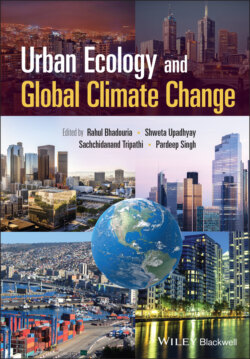Читать книгу Urban Ecology and Global Climate Change - Группа авторов - Страница 10
Оглавление
Foreword
R. K. Kohli
Nature produces enough for everyone's need. It also has in place the cyclic processes for the regeneration of nature's gifts. However, for his convenience man has introduced the concept of settlements in urban areas, beyond their carrying capacities. Hardly has any country evaluated the natural resource‐carrying capacity of any area before the settlement of human population. This has not only disturbed the natural balance resulting in consequential impacts reflected in the form of pollution of air, water, soil, sound, and creation of perceptible urban heat island and thermal inversions but also resulted in social unrest, increased crimes, irritability, and impaction on human health.
Unfortunately, man evaluates every action in terms of economics without realising that the man‐made currency does not follow the currency and principles of nature. The economists and ecologists unfortunately had been contradicting each other. The former had always been winning, and the latter cribbing. However, the last laugh is of the ecologist, especially when natural calamities and catastrophes occur. It is no exaggeration that the incidence and dimensions of such horrific events including floods, hurricanes, and pandemics have unfortunately increased lately, Undoubtedly, such events impact the future of earth's biosphere. For such reasons, the need for trees and green spaces, etc. for sustainable ecological balance is more in urban areas. Our actions need to match with the desired well‐defined sustainable goals.
It is gratifying to note that the editors of the book ‘Urban Ecology and Global Climate Change’ have chosen very well thought of five thematic sections focussing mainly on the interplay between cause and effect of urban pressure and climatic sustainability. These sections range from the perspective of (i) urban ecology and climate change, (ii) emerging technologies for designing urban landscape, (iii) urban biodiversity and natural resource exploitation, (iv) impact of fast urbanisation on the development sustainability, and (v) threat of climate change to ecological conservation. These themes have been very intelligently covered through 16 chapters. The choice of the editors for contributing authors of the 16 chapters is worth appreciation. It ranged from different parts of India besides scientists from Thailand, Czech Republic, Austria, Bangladesh, and Nepal.
In my opinion, the book will be very useful to the students and scientists not only in the field of environment and ecology but equally well for the town and country planning, policymakers, architects, managers of the river and coastal areas, and state and central government decision‐makers, that too, not only in India, but the world over.
While congratulating the editors, authors, and the publishers for producing this title, I extend my best wishes for the success of the title which is very timely and relevant.
R. K. Kohli PhD, FNA, FASc, FNASc, FNAAS, FBS, FNESA
Vice Chancellor, Amity University Punjab, Mohali – 140306, India
Professor, JC Bose National Fellow, Certified Senior Emeritus Ecologist, ESA, USA Former Vice chancellor, Central University of Punjab
2021
